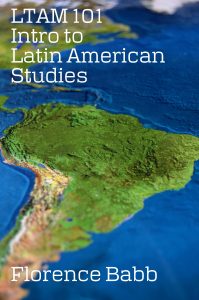Fall 2018
ANTH 89: Transforming Our Food System
Dr. Don Nonini
 This course focuses on an analytical and ethnographic critique of the transnational corporate food economy, and on its classed, raced and gendered exclusions and oppression of workers and people of color, and explores alternative food practices that embody challenges to its domination.
This course focuses on an analytical and ethnographic critique of the transnational corporate food economy, and on its classed, raced and gendered exclusions and oppression of workers and people of color, and explores alternative food practices that embody challenges to its domination.
LTAM 101: Intro to Latin American Studies
Dr. Florence Babb
 This course introduces the interdisciplinary field of Latin American Studies. Readings encompass discussion of Mexico and Central America, South America, and the Caribbean, with significant attention to Latin America in the global context. We highlight recent developments in the region and the broader context of the Americas, which include the United States and Canada in North America, and the complex history of relationships throughout the hemisphere. There is an emphasis on histories of difference and inequality that are evident on a notably uneven playing field. We focus on race, class, gender, and sexuality and ask whether legacies of colonialism and inequality are being overcome or persist in the contemporary period of neoliberal development and globalization.
This course introduces the interdisciplinary field of Latin American Studies. Readings encompass discussion of Mexico and Central America, South America, and the Caribbean, with significant attention to Latin America in the global context. We highlight recent developments in the region and the broader context of the Americas, which include the United States and Canada in North America, and the complex history of relationships throughout the hemisphere. There is an emphasis on histories of difference and inequality that are evident on a notably uneven playing field. We focus on race, class, gender, and sexuality and ask whether legacies of colonialism and inequality are being overcome or persist in the contemporary period of neoliberal development and globalization.
AAAD260: Blacks in Latin America
Dr. Maya J. Berry
 We will focus on the historical, cultural, social, and political dimensions of slavery, racial formation, and race relations in Latin America. What impact has nationalist ideologies had on contemporary racial dynamics and the ways in which members of Afro-Latin communities have struggled for full citizenship and social justice? Cuba will be highlighted as a unique case study to explore these dimensions in-depth. The course will conclude by looking at Afro-Latinx experiences in the U.S.
We will focus on the historical, cultural, social, and political dimensions of slavery, racial formation, and race relations in Latin America. What impact has nationalist ideologies had on contemporary racial dynamics and the ways in which members of Afro-Latin communities have struggled for full citizenship and social justice? Cuba will be highlighted as a unique case study to explore these dimensions in-depth. The course will conclude by looking at Afro-Latinx experiences in the U.S.
ANTH 347: Travel and Tourism
Dr. Florence Babb
 This course considers anthropological approaches to travel and tourism in the contemporary world and asks what focusing on travel and tourism can tell us more broadly about cultures and societies. We examine differences of race, class, gender, sexual orientation, and national origin among travelers as well as of those who work in the service industries that accommodate travelers’ needs. We examine ways in which travel destinations are represented and marketed as “exotic” locations, appealing to notions of the desirable, foreign “other.” We ask how the commodification of cultural identities and practices shapes the tourism encounter of tourists and toured. Most fundamentally, we ask how power relations are negotiated and what prospects communities in the global South have for constructing the terms of their engagement with travelers from the global North.
This course considers anthropological approaches to travel and tourism in the contemporary world and asks what focusing on travel and tourism can tell us more broadly about cultures and societies. We examine differences of race, class, gender, sexual orientation, and national origin among travelers as well as of those who work in the service industries that accommodate travelers’ needs. We examine ways in which travel destinations are represented and marketed as “exotic” locations, appealing to notions of the desirable, foreign “other.” We ask how the commodification of cultural identities and practices shapes the tourism encounter of tourists and toured. Most fundamentally, we ask how power relations are negotiated and what prospects communities in the global South have for constructing the terms of their engagement with travelers from the global North.
ANTH 427: Race
Dr. Karla Slocum
 The objective of this course is for upper level anthropology majors to understand and critically explore different influential arguments and debates about categories of race, how they developed, how they function, and what they mean for individuals’ lived experience. As a starting point, we critically examine anthropologists’ contribution to an understanding of race. Students in the course also explore the implications of race and racial categorizations in the context of science, identity, history, power, economics and social justice. Finally, students explore how different groups of people come to be racially identified and what that identification process means for the way they live their lives.
The objective of this course is for upper level anthropology majors to understand and critically explore different influential arguments and debates about categories of race, how they developed, how they function, and what they mean for individuals’ lived experience. As a starting point, we critically examine anthropologists’ contribution to an understanding of race. Students in the course also explore the implications of race and racial categorizations in the context of science, identity, history, power, economics and social justice. Finally, students explore how different groups of people come to be racially identified and what that identification process means for the way they live their lives.